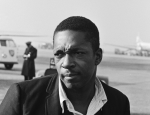John Coltrane Talks About the Sacred Meaning of Music in the Human Experience: Listen to One of His Final Interviews (1966)

A few years ago, the animated series Blank on Blank released a video with five minutes from one of John Coltrane’s last interviews in 1966, eight months before his death from liver cancer at age 40. In the excerpts, Coltrane tells interviewer Frank Kofsky, a Pacifica Reporter, about his intuitive approach to practicing, his switch to soprano sax, and his desire to “be a force for real good.” As juicy as these tidbits are for Coltrane fans, the full interview, above, is even better—an hour-long encounter with the jazz saint, who opens up to Kofsky in his relaxed, yet guarded way.
Coltrane chooses his words carefully. His refusal to elaborate is often its own subtle form of expression. During their opening banter, Kofsky asks him about seeing Malcolm X speak just before the latter’s death. Coltrane calls Malcolm “impressive” and leaves it at that. Kofsky then asks his first pointed question: “Some musicians have said that there’s a relationship between some of Malcom’s ideas and music, especially the new music. You think there’s anything in there?”
Kofsky had his own reasons for pushing this line. Just a few years later, he published Black Nationalism and the Revolution in Music in 1971. The book was reprinted with the more specific, less threatening, title John Coltrane and the Jazz Revolution of the 1960s. Both versions prominently feature Coltrane on the cover. “Dedicated to both John Coltrane and Malcolm X,” notes Soul Jazz Records, the book “places the revolutionary ‘new thing’ music and ideas of Coltrane, Albert Ayler and others in a wider context of 60’s radicalism, African American politics and history.”
An historian and academic who published several books on jazz, Kofsky isn't subtle about his agenda, but Coltrane is unwilling to be pushed into a political corner, as fans have pointed out in discussions of this interview. He wants to embrace everything. “I think that music, being an expression of the human heart, or the human being itself,” he says, “does express just what is happening. It expresses the whole thing.” He consistently refuses to get drawn into a discussion of racial politics with Kofsky.
When they finally move on to talking about performance, the unflappable Coltrane stops demurring and opens up. We hear him describe his experience of being on stage at one concert as “too busy” to know what was happening in the audience, but the right audience can also be, he says, a participating member of the group. When Kofsky again pushes Coltrane on the relationship between his music and black nationalism, Coltrane coolly replies, “I have consciously made an attempt to change what I’ve found. In other words, I’ve tried to say, ‘this could be better, in my opinion, so I will try to do this to make it better.”
Coltrane’s knack for cutting to the heart of his purpose—to add to the world with his playing, without a need to control what happens afterwards—comes through in the entire hour-long interview. His reticence to engage with Kofsky’s analysis might have something to do with who was asking the questions, but in any case, there’s no doubt that Coltrane was integral to the fierce, uncompromising Black Arts poetry of the 1970s, and many other politically informed movements. He was influential, however, not as the representative of an ideology, but as the inventor—or the vessel, he might say—of an entirely new form of creative expression.
Related Content:
An Animated John Coltrane Explains His True Reason for Being: “I Want to Be a Force for Real Good”
John Coltrane Performs A Love Supreme and Other Classics in Antibes (July 1965)
John Coltrane Talks About the Sacred Meaning of Music in the Human Experience: Listen to One of His Final Interviews (1966) is a post from: Open Culture. Follow us on Facebook, Twitter, and Google Plus, or get our Daily Email. And don't miss our big collections of Free Online Courses, Free Online Movies, Free eBooks, Free Audio Books, Free Foreign Language Lessons, and MOOCs.
from Open Culture https://ift.tt/37xnnID
via Ilumina
Comments
Post a Comment